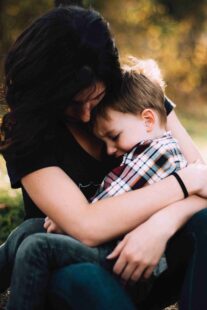Children and Divorce: How to Lessen the Impact
Nathan Ainley
 Divorce is challenging, even for couples who amicably split. There is the loss of a relationship, the dreams of a future together, and raising your children in the same home. The process of separation and divorce is rough on the couple and even more so on the children they share. As many as 61% of first-time divorcing couples share children.
Divorce is challenging, even for couples who amicably split. There is the loss of a relationship, the dreams of a future together, and raising your children in the same home. The process of separation and divorce is rough on the couple and even more so on the children they share. As many as 61% of first-time divorcing couples share children.
Preparing your children for the changes can help lessen the impact of divorce. Children are more likely to blame themselves for the separation, get into trouble at school, or let their grades slip as they try to deal with the divorce.
Emotional outbursts, anger, anxiety, and depression can develop in children. Children ages 7 to 14 are more likely to lash out as they are old enough to understand what is happening, but too young to cope maturely.
It may take time and patience, but you can learn how to deal with divorce and children effectively.
Tips for dealing with children and divorce.
Preparation and honest communication are the keys to a smoother transition regarding divorce and children. Whether your impending divorce is amicable or not, keeping communication lines open between the parents and child is critical for the child’s mental well-being and sense of acceptance.
Children often blame themselves for their parents’ divorce. They tell themselves false stories that become beliefs. For example, they may think, “If I was only a better kid…if I’d had better grades…if I’d been more enthusiastic about going on trips with them.” Of course, these are all false beliefs, but a child is too young and emotionally immature to recognize these untruths.
As parents, it is our responsibility to help our children through divorce. This is a traumatic time in a parent’s life, but when children are involved, the couple must shift their focus onto the family.
Communicate with your child.
Adults want to protect their children from the hurts of this life, and to some extent, they should. But you must lead with open and honest communication regarding divorce and children. Depending on your child’s age, you can leave out specific details. However, filling your child in on what is happening and what they can expect keeps your child from being caught off guard.
Open communication also gives the child a chance to ask questions and for you to reassure them that their parents still love them and that the decision to divorce is not from anything that they did. Let your child know that you will always love them and do what you feel is best for them.
Allow your child time to grieve.
Divorce is similar to losing a loved one; it is the death of a relationship. Just like the couple will need time to go through the grieving process, children need ample time to grieve and work out their emotions. Unfortunately, sometimes in our haste to get through the divorce, we forget that children are affected.
Unless a child feels safe enough to express their feelings, they may bury those emotions. Unfortunately, other problems can manifest as an outlet for these emotions. Insecurity, rejection, and anger can result in behavioral issues at school and fights with peers. Self-harm, isolation, eating disorders, and sleep issues can stem from depression.
The grieving process consists of five steps: denial (shock), anger, bargaining, depression, and acceptance. If your child is grieving, speak to a counselor about how to help your child.
Keep your negative opinions to yourself.
No matter what you think of your ex, keep your negative opinion to yourself in front of your children. If you co-parent, make this clear at the beginning that neither parent should speak ill of the other in front of the children.
Ranting about your child’s other parent or making mean or insulting comments places your child in a tough spot. The child feels as if they have to pick a side. Your child does not want to hurt either parent. Placing the child in that position is cruel.
Instead, speak quietly with the former spouse away from the child if you must argue. Do not use your child as a messenger; message the other parent directly. You and your ex are adults and must handle the divorce constructively. If your relationship with your ex is far from friendly, use a mediator to reach an agreement.
Nurture the parent-child relationship.
 Whether you share custody or have full custody, nurturing the relationship between the other parent and the child is essential. Your child should never feel guilty for leaving you to spend time with the other parent. Make visitations or co-parenting part of the new routine. Build up the excitement about your child spending time with their other parent.
Whether you share custody or have full custody, nurturing the relationship between the other parent and the child is essential. Your child should never feel guilty for leaving you to spend time with the other parent. Make visitations or co-parenting part of the new routine. Build up the excitement about your child spending time with their other parent.
You can also mention that you will miss them and what you will do when they return, but never make it sound like you resent the relationship between your ex and your child. Your child needs to feel secure, safe, and wanted. You can impart that feeling of acceptance and love by nurturing the parent-child relationships.
Watch out for new academic or behavioral problems.
Understandably, you are struggling through your divorce, trying to pick up the pieces of your life. Regardless, you still must be a presence in your child’s life. Your child needs you more than ever to reassure them that you love them and are a stable component.
By staying actively involved with your child, you can catch problems early. Academic and behavioral issues can crop up during or after a divorce, especially in grade and middle school-age children. Teens may find other ways to express their frustrations with risky behaviors, alcohol, and substance abuse.
Keep your eye out for changes in their behavior or grades. You may want to mention the change happening at home to their teacher (if they are in elementary school) or their school counselor. Counselors can offer their services, allowing the child to speak openly.
Maintain a routine.
Children thrive on routine. Of course, after a divorce, the routine will change. But try to work familiar habits into your child’s day. Have them wake up at the same time and do their morning routine. For example, have them brush their teeth, get dressed, and make the bed to start the day. If you usually take them to school in the mornings, try to resume that if feasible. Ask them about their homework and offer to help.
You want to make the routine familiar and comforting. Also, consider adding new activities to the week. For example, make Friday nights movie nights or Saturdays at your house game night with pizza. Children are less likely to derail if they have things to look forward to with their families.
Seek the help of a family counselor.
If you are reading this after your divorce and were so wrapped up in the trauma surrounding the separation that a distance has formed between you and your child, know that it is never too late to save the parent-child relationship. You both went through a life-changing season. Reach out to your child and reassure them that you are in a better place now and apologize for being stuck in the grieving process.
The willingness of your child to grow closer may depend on their age. Younger children are more likely to return to the relationship, but teens can be wary. You may want to seek guidance from a family counselor. These sessions will allow you and your child to voice the needs and wants of the relationship. The counselor can also teach you communication skills and conflict-resolution strategies.
When your child needs help dealing with the divorce.
Traumatic childhood events can lead to later emotional problems if not handled appropriately. Although you may prepare your children for divorce as best as possible, they may still struggle with grief, anxiety, depression, anger, and behavioral issues.
Reach out to our office today to schedule a call with one of our counselors specializing in divorce and children. Your counselor can arm your child with techniques to move through the grieving process and equip them with lifelong skills to overcome anger and mood swings. Give us a call today.
“Broken Heart”, Courtesy of Kelly Sikkema, Unsplash.com, CC0 License; “Cuddles from Mommy”, Courtesy of Jordan Whitt, Unsplash.com, CC0 License; “Lego Lady”, Courtesy of Jackson Simmer, Unsplash.com, CC0 License; “Off to School”, Courtesy of Colin + Meg, Unsplash.com, Unsplash+ License








